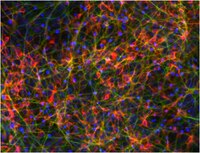| Storage Conditions | When stored at 2 - 8°C, the IHC Select™ Immunoperoxidase Secondary Detection System is stable up to the expiration date printed on the kit label. Do not freeze or expose to elevated temperatures. Discard any remaining reagents after the expiration date. Do not store kit components or perform staining in strong light, such as direct sunlight.
Precautions:
· Pooling, substitution or alteration of any reagent may cause erroneous results.
* Do not mix reagents from different lots.
* Do not allow the slides to dry at any time during the staining procedure.
* Handle all specimens and materials coming in contact with them as potentially infectious materials. Disinfect with 0.05% sodium hypochlorite.
* Do not mouth pipette reagents. If ingested, seek professional assistance or contact a Poison Control Centre immediately.
· Diaminobenzidine (DAB) may be carcinogenic. This solution may cause irritation upon skin contact. Avoid inhalation, ingestion, or skin contact and wear gloves when handling DAB. If skin contact occurs, flush affected area with water. Spills may be 'neutralized' with bleach25,26. Dispose of according to local regulations.
· Inhalation or ingestion of xylene or the highly allergenic fixative formaldehyde is harmful. These materials should be handled with gloves. Prepare in a fume hood. If skin or eye contact occurs, wash thoroughly with copious amounts of water.
· Wear disposable gloves when handling any human material and while performing the staining procedure. |













